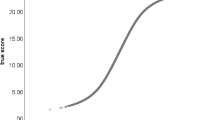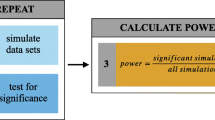Abstract
The K-R (21) formula can be derived without recourse to the undesirable assumption that the test items are all indistinguishable.
Similar content being viewed by others
References
Lord, F. M. Sampling fluctuations resulting from the sampling of test items.Psychometrika, 1955,20, 1–22.
Lord, F. M. Tests of the same length do have the same standard error of measurement.Educ. psychol. Measmt, in press.
Lord, F. M. Statistical inferences about true scores.Psychometrika, 1959,24, 1–17.
Lyerly, S. B. The Kuder-Richardson formula (21) as a split-half coefficient, and some remarks on its basic assumption.Psychometrika, 1958,23, 267–270.
Author information
Authors and Affiliations
Rights and permissions
About this article
Cite this article
Lord, F.M. Randomly parallel tests and Lyerly's basic assumption for the Kuder-Richardson formula (21). Psychometrika 24, 175–177 (1959). https://doi.org/10.1007/BF02289829
Received:
Issue Date:
DOI: https://doi.org/10.1007/BF02289829




